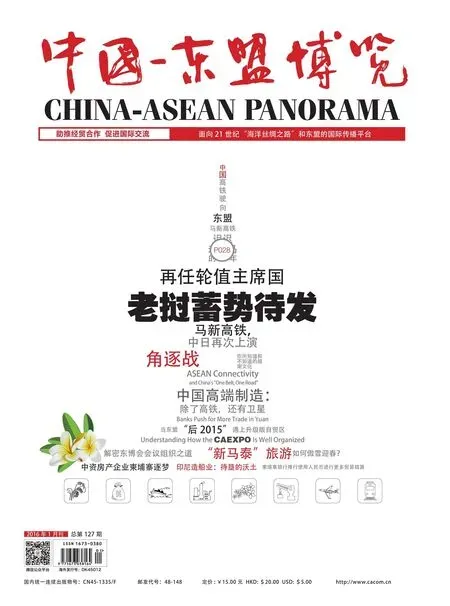印尼造船业:待垦的沃土
□文/本刊记者 陈丽冰
印尼造船业:待垦的沃土
□文/本刊记者陈丽冰

随着全球海运的发展及“一带一路”建设的推进,与此密切相关的船舶业也随之迎来了发展新机遇。作为全球造船第一大国,中国船舶企业在几经发展后,已逐渐走上了世界舞台的顶端。不过,与日本、韩国等国家相比,中国在此领域的海外投资并没有实质性的发展。在此背景下,欲“走出去”的中国企业可乘着“一带一路”和国际产能合作的东风,将目光投向海洋大国——印度尼西亚。
广阔的市场前景
作为世界上最大的群岛国家,船舶、航运对印尼的经济发展至关重要,其90%的货物流动都是依赖船舶运输。尤其是近年来,随着印尼经济的快速发展,人员往来频繁以及煤炭、油气、自然资源等岛际运输需求量猛增,印尼内海航运业船只和运力的供需存在明显的缺口。据印尼工业部预计,今后10年,印尼对邮轮、货船等各类船舶的需求量将达4000艘。
不过,受技术水平和生产设备等原因的制约,印尼的造船业并不发达。目前,在印尼250多家船厂中,只有极少数船厂能建造最大为50000载重吨船舶。更大的船,印尼船厂建造周期太长、且质量缺乏保证,不具备经济合理性,绝大多数会转而到中国或韩国、日本订造。另一方面,在印尼目前拥有的约1.36万艘中,超过40%的船舶船龄均已达30年以上,船舶整体状况陈旧、落后,效率低下,远不能够满足社会经济发展和航运业快速发展的需要,急需新的船舶更替。
2014年,印尼总统佐科•维多多上任后,提出了打造海洋强国理念和建设“海上高速公路”的计划,要通过重点发展海上互联互通,带动海陆空和通讯等基础设施建。其中,造船业作为海上交通运输和互联互通的重要支撑,成为印尼政府重点发展的领域。根据公开信息,2015~2019 年,印尼政府将投资699万亿印尼盾(约合574亿美元)实施“海上高速公路”建设规划,其中101.7万亿盾用于购买船舶,10.8万亿盾用于造船厂更新等。同时,欢迎外国企业在印尼进行造船业投资。这对于中国欲“走出去”的船舶企业来说,无疑是一个重大利好的消息。
走出去“授之以渔”
不过,需注意的是,2015年6月,印尼总统佐科已宣布造船限令,禁止政府部门和国有企事业单位向外国采购船舶,外商要与印尼合作只能到当地投资造船业。因此,中国船企欲与印尼进行长期合作,还要改变以往单纯为其造船的方式,而是发挥中国船企在管理和技术上的相对优势,到印尼与当地企业携手发展造船业,从“授之以鱼”到“授之以渔”。
而这也正是印尼当局乐于促成的事。在印尼造船限令颁布后不久,2015年7月,负责吸引外商投资的政府机构—印尼投资协调委员会曾赴中国浙江、福建两省举行了有关造船业的投资论坛,并专程去相关造船厂考察。
不仅如此,为加强与中国等外国企业的海洋经济合作,印尼还出台了相关扶持政策,如外国投资者可拥有印尼造船厂100%的所有权,船厂建成之后的6年内、每年可享受5%的企业所得税优惠;取消和降低船舶零件的进口关税和增值税、降低造船企业生产环节增值税;同时,落实“一站式”服务,简化投资者在印尼申请投资许可的程序等等。这一系列优惠政策的陆续出台,不仅降低了外国企业在印尼投资造船业的风险,也为中国造船企业进入印尼市场提供难得的机遇。
值得一提的是,在这方面,已有不少中国企业进行了积极探索,为中国船企“走出去”提供了典范。2015年3月10日,中国船级社雅加达办事处在印尼首都雅加达举行开业仪式,将秉承“安全、环保,为客户和社会创造价值”的宗旨,为印尼当地造船和航运提供优质、高效、务实的服务。而中国深圳市粤航进出口有限公司也在印尼代表处的基础上,正式注册了印尼的有限公司,并持续丰富在印尼的船用备件库存。
这些也只是中国船企成功“走出去”的缩影。相信,今后随着“一带一路”建设的不断推进,以及印尼“海上高速公路”政策的落实,将为中国船企投资印尼提供极大的发展空间。中国船企不仅可通过设立海外建造基地的方式,降低造船成本,同时也可与当地企业深入合作,出口相关配套设备出口及服务。
联系编辑:78724815@qq.com
Banks Push for More Trade in Yuan
written by Sor Chandara
W ith trade between Cambodia and China steadily growing,banking sector players have put out a call to increase facilities for businesses using Chinese currency to pay for imports and exports.
Speaking at a workshop organised by the Bank of China,Chen Changjiang,CEO at the Bank of China in Phnom Penh,said the use of the yuan in business transactions had progressed steadily since the bank was appointed by the National Bank of Cambodia (NBC) to be a clearing bank for local and cross-border yuan transactions.
“The internationalisation of the yuan will not only help China increasingly integrate with the world,but can provide more channels for cross-border investments,trade and financial dealing,” Chen said.
He added that the Bank of China’s branch in Phnom Penh had settled 35 million yuan,the equivalent of $5.5 million,in cross-border remittance settlements during the fi rst six months of the year.
The Bank of China is one of two approved yuan clearing banks in Cambodia,along with Industrial and Commercial Bank of China (ICBC).
A number of other local fi nancial institutions offer businesses yuan settlement services.
Bilateral trade between Cambodia and China topped $3.7 billion last year and is expected to reach $5 billion by 2017,according to a Bank of China report.
E Zhihuan,head of the economics and strategic planning department at the Bank of China (Hong Kong),said fast-growing trade relations between Cambodia and China have laid a solid foundation for further development of yuan-based transactions and built up a sizable yuan liquidity pool in Cambodia.
“Cambodian firms will benefit from the use of the yuan in settlements,especially in the case of Cambodian exports to China,where they will receive payments in a stable currency with low volatility,” he said.
“On the flip side,with imports from China,making payments in yuan could increase a trader’s bargaining power and help negotiate for better prices.”
Independent economist Srey Chanthy said the use of the yuan for settlements in trade with China presents no problem for Cambodia’s economy,and will provide better coordination of business activities.But its use for daily transactions could undermine the banking system.
“If we use the yuan,like we do the dollar,there will be problems.It will be complicated for people,who may lose confi dence in the banking system and they could stop depositing money in banks,” he said.
He continued that for trade settlements,using the yuan would protect traders from potential losses due to fl uctuations in the dollar exchange rate.
Bun Mony,chairman of the Cambodia Microfi nance Association,said that the dollar and euro continue to remain the primary currencies for settling payments in Cambodia,with the yuan still being used on only small scale.
“If China wants to promote yuan in business transactions they need to release more yuan in the market,” he said.“If they release more and increase business activity in yuan,I believe it will grow.”
The internationalisation of the yuan will not only help China increasingly integrate with the world,but can provide more channels for cross-border investments,trade and fi nancial dealing.
Resource:www.phnompenhpost.com
- 中国-东盟博览(政经版)的其它文章
- 汽车
- nformation
- 农业
- 旅游
- 马新高铁迟迟未上马的17年
- 金融

